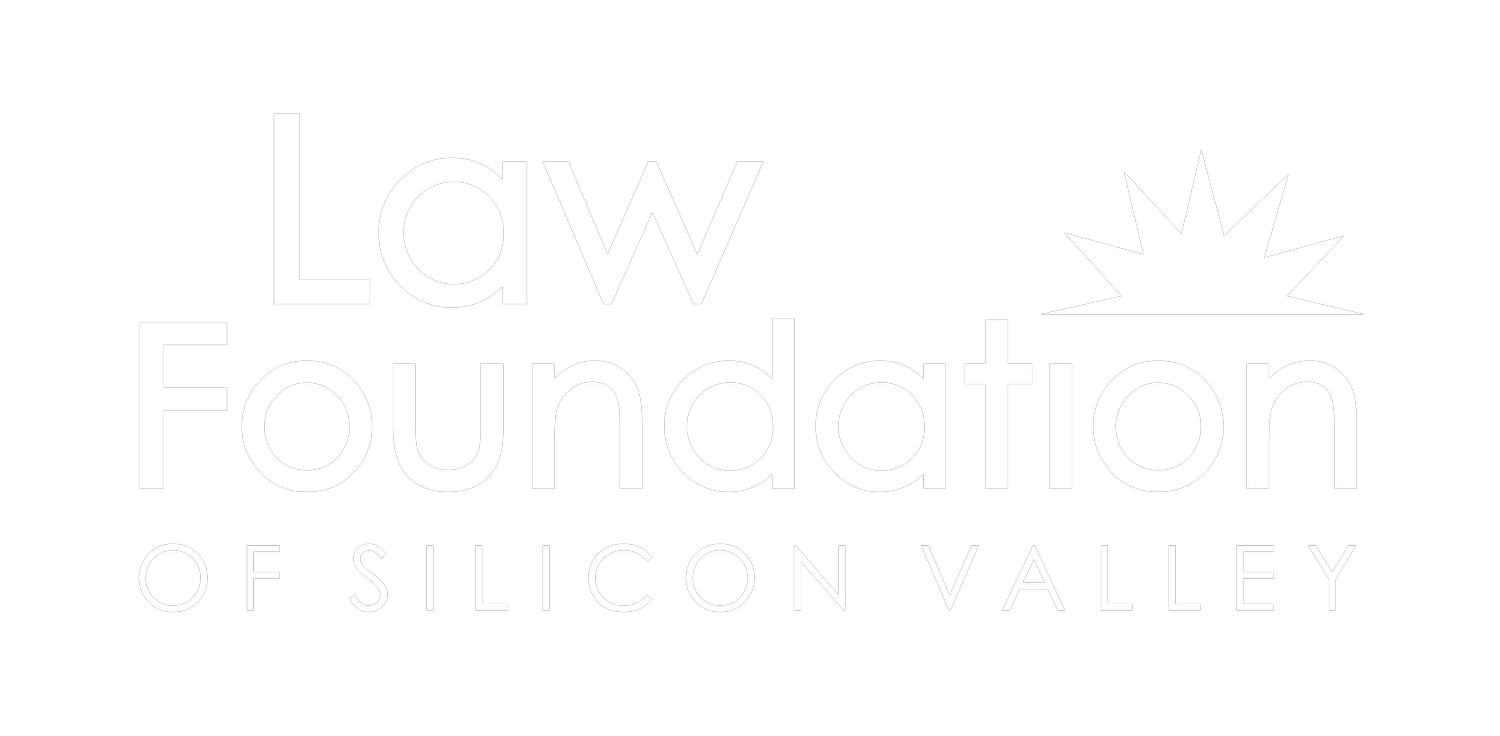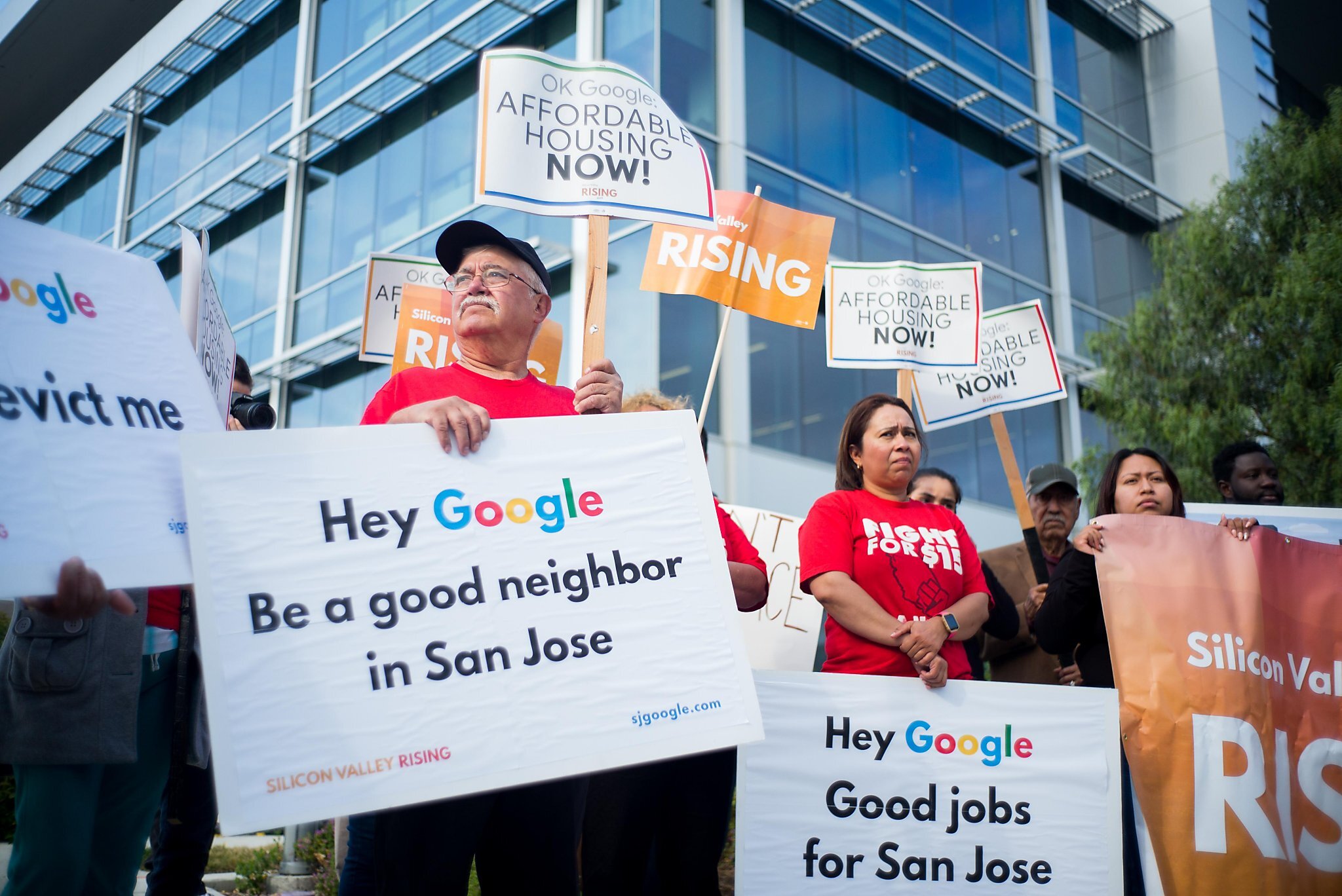January 24, 2022
Santa Clara County Board of Supervisors
70 W. Hedding Street San Jose, CA 95110
Via email only to: BoardOperations@cob.sccgov.org.
RE: Board Referral 109221: Improve Public Safety by Expanding Behavioral Health Care and Alternatives to Pretrial Incarceration
I. Introduction
The Law Foundation of Silicon Valley strongly supports Referral 109221 to improve public safety by expanding behavioral health care and alternatives to pretrial incarceration. The Law Foundation of Silicon Valley is a legal services non-profit that advances the rights of historically excluded individuals and families through legal services, community lawyering, strategic litigation and advocacy, and outreach. Among our many services, we represent mental health consumers in civil commitment and capacity hearings and assist clients with accessing mental health treatment. We recognize that many systems play a role in health equity and social determinants of health, including jails, prisons, law enforcement, and other structures that uphold carceral systems. We believe that our legal and policy advocacy should support and advance health equity and reduce the likelihood that these systems cause barriers for communities.
As we previously shared with the Board of Supervisors in our November 15, 2021 letter (attached), jails and prisons fail to improve public safety or rehabilitate those accused of crimes.(1) Incarceration in our criminal legal system exacerbates racial inequities and interferes with opportunities to access meaningful treatment, especially for disproportionately criminalized individuals including communities of color, unhoused, immigrant, and LGBTQ+ people. The construction of any new jail facility in Santa Clara County fails to address racial disparities, public health concerns, and widespread opposition to criminal legal system expansion. We urge the Board of Supervisors to instead pursue the recommended actions in the Referral and support long-term, equitable public health and safety in SCC.
II. The expansion of community-based alternatives to incarceration is urgently necessary to mitigate the crisis of mental health and substance abuse in Santa Clara County
The Law Foundation urges the Board of Supervisors to implement the actions recommended in Referral 109221 to expand non-carceral, community-based behavioral health resources so that people can seek care and treatment within the context of their homes and lives. Without a variety of options, we will continue to fail the needs of mental health consumers in Santa Clara County.
It is imperative that Santa Clara County cease any plans to build a new jail or other carceral facility, especially given the deficiencies of the County Executive Office’s November report.(2) First, this report falsely conflated people under maximum security designations with dangerousness and mental health acuity. Santa Clara County jail houses mostly pre-trial residents held on non-felony charges. Even for those facing felony charges, the report’s data blurred being charged with a serious felony with being convicted of one, and ultimately, because of the District Attorney’s ability to charge an individual with multiple felonies, an individual may be found guilty of a non-serious (and non-violent) felony regardless of their original charges. Critically, the report also lacked any data combining the severity of one’s criminal charges with their mental health status, despite the fact that jail population data suggests that mental health consumers in the jail tend to cycle in and out relatively quickly on petty charges.(3) These people are not dangers to public safety, but rather, members of our communities themselves in need of support and compassionate care.
Next, the County still has not provided a cost analysis, a rationale for a locked behavioral health site, and a needs assessment for the existing space. The report neither analyzed the cost and benefits of improving existing facilities compared to constructing a new jail, nor the costs of renovating existing facilities and alternatives to incarceration that could eliminate the need for a new jail.(4) The report also lacked a rationale for why a behavioral health site should be constructed at the new jail, the numbers of jail detainees who would receive mental health services, or even the behavioral health services that would be offered. Furthermore, the County is preemptively deciding whether to proceed with a new jail before completing a foundational Needs Assessment regarding current jail conditions and “needs related to programming, treatment, medical and behavioral health treatment, through the lens of legal imperatives, statutes, rules, and limitations.”(5)
Investments in correctional mental health services perpetuate false perceptions of substance use and mental health issues as criminal matters. Instead of confining people in jails, the County should expand community-based diversion programs where people can receive access to restorative programs and mental health services of their choice. If our community reinvested the enormous sums needed to build a new facility into diversion programs in our community, the numbers of people being arrested, recidivating, and requiring jail beds would decline. Our county's resources should be redirected toward investment in proven diversion programs such as supportive housing and community-based mental health and drug treatment services.
Furthermore, recent COVID-19 surges have illustrated that jails and prisons do not bolster public safety; they fundamentally undermine it. Jails and prisons are incubators for infectious disease. Confinement, poor facilities, close quarters, and shared living conditions mean that it is impossible to control the spread of COVID-19 within jails and prisons without implementation of active decarceration strategies. SCC Jail reported its first COVID-19 death in November 2021 despite urging from health officials to bring the jail population down significantly to allow or quarantine and isolation protocols.(6) Amnesty and early release measures implemented in the beginning of the pandemic reduced SCC jail populations somewhat and did not correlate with an increase in violence or crime. In fact, since 2006, California’s prison population has been dropping steadily without putting public safety at risk.(7)
III. Alternatives to incarceration are essential to address racial disparities in SCC and root causes of systemic inequities
The recommendations in Referral 109221 are also urgently necessary to address pervasive racial disparities in Santa Clara County’s jail system. As the Board of Supervisors noted in prior meetings, Latinx residents are overrepresented in the County jail by nearly twofold, and Black residents are overrepresented by nearly four-fold compared to their percentage in the County overall.(8) Black individuals are 6.5 times and Latinx individuals are 3 times more likely to be booked in County jails compared with white individuals.9 Furthermore, the discriminatory treatment of Black and brown communities in jail is compounded by injustice across the criminal legal system, including racial profiling, police misconduct, higher bail amounts, and longer sentencing.(10)
Rather than providing services, rehabilitation, and public protection, incarceration exacerbates racial disparities by causing loss of jobs and housing, disconnection from families and communities, trauma, and adverse health impacts.(11) This impacts not only the incarcerated individuals themselves, but also their children, families, neighbors, coworkers, and Santa Clara County as a whole.
Communities of color in Santa Clara County deserve to feel safe and to thrive. By building a new jail and expanding punitive approaches to public safety, the County would just increase the numbers of incarcerated people of color and people with disabilities. Research from the Vera Institute has demonstrated that when jail capacity expands, law enforcement officials prosecute more crimes and detain people accused of crimes for longer durations.(12) A new jail would perpetuate the disproportionate incarceration of Black and Latinx individuals in Santa Clara and undermine efforts to make Santa Clara a more racially equitable environment for everyone.
Resources should be focused on public health prevention and intervention rather than punitive measures that would further criminalize communities of color in the criminal legal system. This includes the recently launched community-based mobile response team and other entry points, social services, and interventions for responding to mental health beyond law enforcement. Alternatives to incarceration, including those within Referral 109221, are vital towards beginning to undo the inequities within Santa Clara County and meaningfully improve public health and safety.
IV. Impacted communities in Santa Clara County overwhelmingly support community-based and non-carceral treatment services
Finally, the Law Foundation urges the Board of Supervisors to take direction from Santa Clara County residents themselves, who have consistently called for non-carceral solutions to address the root causes of crime and violence.(13) In particular, voter surveys and focus groups conducted by the W. Haywood Burns Institute in 2021, in collaboration with the County, indicated strong support for providing more mental health and substance use treatment rather than incarceration.(14) These community engagement sessions reflected voices from across Santa Clara County, including a diversity of race, class, language, and direct and indirect connections to the carceral system.(15) The participants emphasized that jail, as a place designed to restrain and punish people, could never be therapeutic. After a rigorous community engagement process, the Haywood Burns Institute’s findings recommended diversionary measures focused on mental health therapy, sobering centers, rehabilitation centers, peer respite homes, and other preventative measures to address the impacts of structural racism.(16)
Moreover, in recent years, popular support for alternatives to jail has accelerated across California in tandem with critical racial and social equity movements, and Santa Clara County is well-positioned to join these statewide efforts in addressing the failures of our jail systems. These include county initiatives to reduce jail populations, avoid jail expansion, expand rehabilitative treatments, and pursue alternatives to jail.(17) By redirecting public safety and public health resources towards alternatives to incarceration instead of building new jails, Santa Clara County can similarly demonstrate its leadership in pursuing non-punitive and equity-driven solutions to community safety.
V. Conclusion
As patient advocates and attorneys, we believe that building a new jail in Santa Clara County would be extremely detrimental to the safety, health, and well-being of our clients and their communities. We strongly urge the Board of Supervisors to pursue the recommended actions listed in Referral 109221 and support the expansion of community-based alternatives to incarceration instead.
Sincerely,
Abre’ Conner Rebecca Basson Joanna Xing
Directing Attorney Staff Attorney Staff Attorney
Endnotes
1) Kevin Bliss, “California Prison Rehabilitation Programs Costly and Ineffective,” Prison Daily News, Jan. 2020, https://www.prisonlegalnews.org/news/2020/jan/7/california-prison-rehabilitation-programs-costly-and-ineffective
2) See the attached November 15, 2021 letter to the Board of Supervisors for a more detailed analysis of the November report.
3) Santa Clara County Board of Supervisors Agenda Packet (“BOS Packet”), Nov. 16, 2021, pg. 103-4.
4) BOS Packet, pg. 124.
5) BOS Packet, pg. 115.
6) Robert Salonga, “Santa Clara County records first jail death from Covid-19,” The Mercury News, https://www.mercurynews.com/2021/12/02/santa-clara-county-records-first-jail-death-from-covid-19/.
7) Peter Wagner, Prison Policy Initiative, “Large scale releases and public safety,” Apr. 9, 2020, https://www.prisonpolicy.org/blog/2020/04/09/large-scale-releases/.
8) BOS Packet pg. 202.
9) Id.
10) Wendy Sawyer, Prison Policy Initiative, “How race impacts who is detained pretrial,” (Oct. 9, 2019), https://www.prisonpolicy.org/blog/2019/10/09/pretrial_race/; Vilissa Thompson, “Understanding the Policing of Black, Disabled Bodies,” Center for American Progress, (Feb. 10, 2021), https://www.americanprogress.org/issues/disability/news/2021/02/10/495668/understandingpolicing-black-disabledbodies/;
11) Lucius Couloute and Daniel Kopf, Prison Policy Initiative, “Out of Prison & Out of Work: Unemployment Among Formerly Incarcerated People,” Jul. 2018. https://www.prisonpolicy.org/reports/outofwork.html; Nick Gerda, “Job Losses Amid Jail Stints Are a Key Factor in Family Homelessness,” Voice of OC, Oct. 22, 2021 https://voiceofoc.org/2021/10/job-losses-amid-jail-stints-are-a-key-factor-in-family-homelessness-da-says/; Katie Rose Quandt and Alexi Jones, Prison Policy Initiative, “Research Roundup: Incarceration can cause lasting damage to mental health,” May 13, 2021, https://www.prisonpolicy.org/blog/2021/05/13/mentalhealthimpacts/.
12) Chris Mai, Mikelina Belaineh, Ram Subramanian, and Jacob Kang-Brown. “Broken Ground: Why America Keeps Building More Jails and What It Can Do Instead.” New York: Vera Institute of Justice, (2019).
13) Tran Nguyen, “Coalition pushes for alternatives to new Santa Clara County jail,” San Jose Spotlight, Jan. 20, 2022, https://sanjosespotlight.com/coalition-pushes-for-alternatives-to-new-santa-clara-county-jail-silicon-valleysan-jose/; Special to San Jose Spotlight, “Cordell: Rejecting a new county jail,” San Jose Spotlight, Jan. 18, 2022, https://sanjosespotlight.com/cordell-rejecting-a-new-county-jail/; Robert Salonga, “Santa Clara County: Pitch to resume jail project riles activists who pushed treatment center,“ The Mercury News, Nov. 15, 2021, https://www.mercurynews.com/2021/11/15/santa-clara-county-pitch-to-resume-jail-project-riles-activists-whopushed-treatment-center/; Tran Nguyen, “San Jose residents protest jail plans, call for sheriff to step down,” San Jose Spotlight, Aug. 27, 2021, https://sanjosespotlight.com/san-jose-residents-protest-plans-to-build-new-jail-callfor-sheriff-to-step-down/.
14) BOS Packet, pgs. 116-17; Silicon Valley De-Bug, “Decarceration Report,” Jan. 20, 2022, https://www.siliconvalleydebug.org/stories/decarceration-report.
15) Id.
16) BOS Packet pg. 119.
17) Alameda County Board of Supervisors, “Resolution Adopting a ‘Care First, Jails Last’ Policy in Alameda County and Establishing a ‘Care First, Jails Last Committee’,” https://www.afsc.org/sites/default/files/documents/Care%20First%2C%20Jails%20Last%20Draft%20Resolution%2 02April2021.pdf, October 2021; Work Group to Re-envision the Jail Replacement Project, “Work Group to Reenvision the Jail Replacement Project Final Report,” https://www.sfdph.org/dph/files/jrp/WorkGroupRe-envisionJailReplacement.pdf, October 2016; Sacramento County Board of Supervisors Agenda Packet, Mar. 10, 2021; Los Angeles County Board of Supervisors, “Cancellation of Design-Build Contract with McCarthy Building Companies, Inc.’, Aug. 13, 2019, http://file.lacounty.gov/SDSInter/bos/supdocs/139739.pdf; San Diego County Board of Supervisors Agenda, Oct. 19, 2021.






















